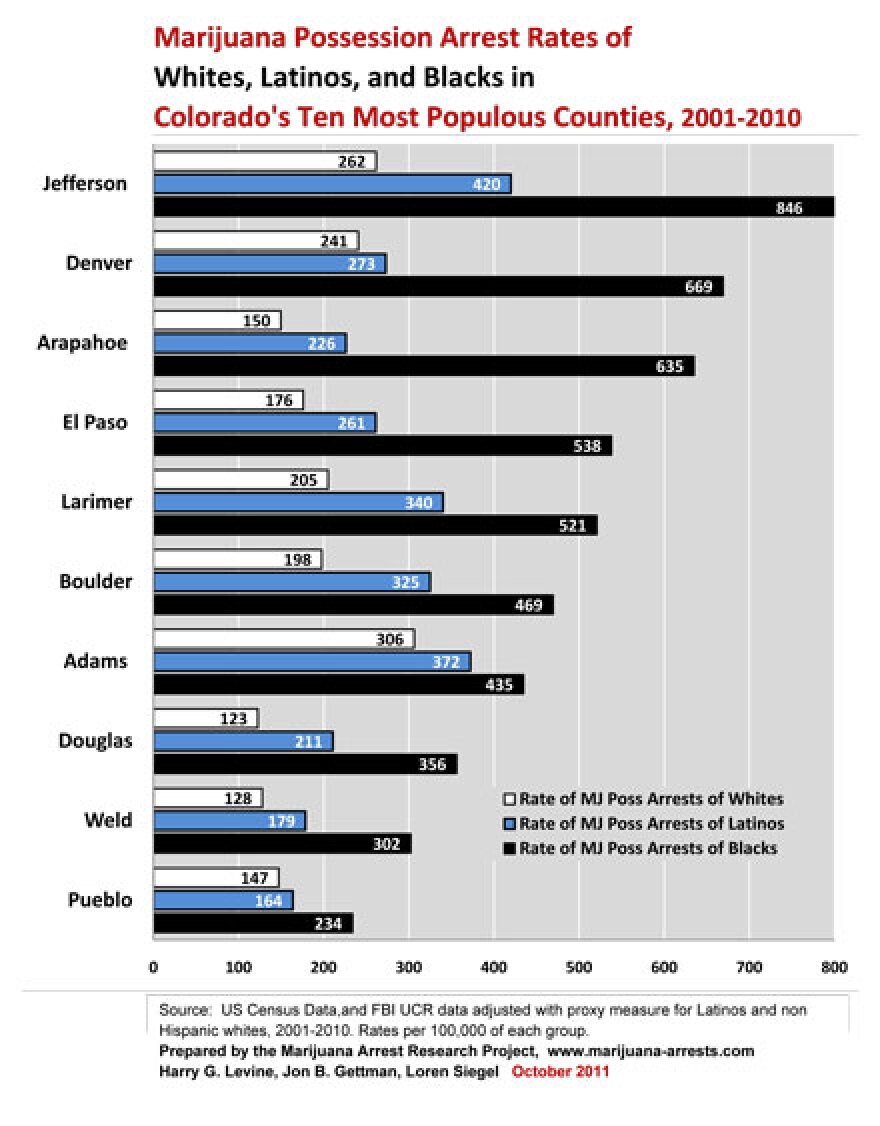The Colorado Bureau of Investigation reports that 10,259 people were arrested in the state for possession of marijuana last year, despite the fact that 100,000 people now have the legal right to use medical marijuana.
The number of people arrested for possession had been dropping since 2007, but rose 7 percent last year, CBI figures show.
The increase comes despite more lenient laws and enforcement in Colorado. Medical marijuana dispensaries have been licensed, and 2 percent of Coloradans have obtained a card granting them the right to use marijuana for medicinal purposes. Voters have told a number of cities to cut back on enforcement. And Coloradans are about to decide on outright legalization in the vote on Amendment 64.
Attorney Brian Vicente, the co-chair of the Amendment 64 campaign, said he doesn’t know why possession arrests have been rising. CBI spokeswoman Susan Medina said the bureau only collects the statistics and does not analyze them.
Weld County District Attorney Ken Buck, who opposes legalization, has said police often find marijuana when arresting people for more serious crimes, like burglary.
Of those arrested for possession of marijuana, African-Americans are cited at higher rates than whites in Colorado, even though studies show they use the drug less. A group called the Marijuana Arrest Research Project says that in the last 10 years, FBI data show African-Americans were arrested at 3.1 times the rate of whites in Colorado. The arrest rates for blacks were at least two-to-one in eight of the state’s 10 largest counties.

The Marijuana Arrest Research Project, based in New York, also estimated that Latinos in Colorado were arrested at 1.5 times the rate of whites, said the group’s Harry Levine. That estimate was based on a scholarly statistical adjustment, Levine said, because the FBI doesn’t count Hispanics separately.
The high number of arrests, and particularly the disproportionate number of minorities, has prompted the Colorado conference of the National Association for the Advancement of Colored People to endorse Amendment 64.
“This is a civil rights issue because it disproportionately affects communities of color,” said Rosemary Harris Lytle, president of the Colorado conference. Proponents argue that ending marijuana arrests entirely would resolve the question of bias.
But Laura Chapin of SmartColorado/No on 64 said that legalizing the entire marijuana industry is not the answer to a problem of discriminatory law enforcement. There are other ways to eliminate discrimination, she says, besides legalizing commercial-scale growing, distribution and sale of the drug.
The Marijuana Arrest Research Project report says minorities are disproportionately arrested due to the police practice of intensive patrolling of certain neighborhoods, typically those with more low-income whites, blacks and Latinos. Stopping and searching people in these areas leads to more minority arrests, the study said.
Having a drug arrest on one’s record can limit job opportunities, housing and admission to college. That can seriously damage the future of the many African-Americans and Latinos caught up in marijuana possession cases, Lytle said.
Misunderstanding about laws might also play a role in why overall arrests are rising. Breckenridge Police chief Shannon Haynes said her municipal arrests rose after the resort town voted to legalize marijuana, resulting in national publicity. Though the charge of possession of marijuana has been removed from its municipal code, there is still a ban on using it in public.
Hayes says she believes arrests rose in Breckenridge – from 21 to 32 from 2008 to 2011 – “because there was a general misimpression that marijuana was now legal in Breckenridge and you could do it anywhere.”
Driving while impaired would remain illegal under Amendment 64, as would using marijuana in public. For example, a random check of four men who pleaded guilty to possession of marijuana in recent Lakewood municipal court cases found all four men might have been cited even if Amendment 64 passes.
Of those four cases, two of the men were driving, and one crashed his car into a concrete barrier. The other two were smoking marijuana in vehicles in shopping mall garages, in sight of security cameras, other shoppers and mall cops.
One of those defendants was Jeffrey Bobitsky, 20, who says he has been smoking pot since he was 15. Bobitsky does not have a medical marijuana card, and was not deterred by his arrest. As he describes it, “We were just smoking bowls, pretty much. Cop pulls up, and I mean the car was pretty much clambaked, so I had to admit to something. Because you pretty much roll down the windows and all the smoke coming out …” Bobitsky ultimately was fined.
It’s impossible to track how many of the 10,000 arrests statewide have resulted in convictions on a person’s criminal record, potentially damaging his or her future. That’s because fewer than a quarter of those arrests ended up in state courts. The majority of the cases were in any one of Colorado’s 271 municipal jurisdictions cities – and there’s no centralized data kept on those cases.
An unknown number of those arrests were people under 21. Under Amendment 64, marijuana would remain illegal, as is alcohol.
Many municipalities have harsher laws than the state, said Vicente, the pro-Amendment 64 attorney. He said Lakewood’s law allows a fine of $1,000 and 30 days in jail, while the state penalty for minor possession carries only a $100 fine and court costs.
Carol McKinley contributed to this story.







